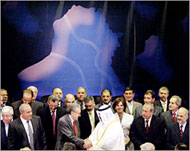Key changes made to the UN resolution
Below is a look at the main changes made in the text of the UN resolution approved on Tuesday.

The original draft was submitted by the United States and Britain on 24 May and the Security Council voted on the fifth version of the resolution:
The original draft started out by reaffirming the sovereignty and territorial integrity of Iraq. The final resolution marks the break with the US and British occupation in stronger language, by “welcoming the beginning of a new phase in Iraq’s transition to a democratically elected government and looking forward to the end of the occupation and the assumption of full responsibility and authority by a fully sovereign and independent interim government.”
Both drafts endorse the formation of the interim government, but the final version limits its powers until an elected transitional government can take over.
Key decisions after January 2005
It states that the interim government must refrain “from taking any actions affecting Iraq’s destiny” after January 2005.
 |
|
Iraq will take a ‘leading role’ in an |
The final draft assigns “a leading role” in convening a national conference in July, arranging elections and drafting a new constitution “as circumstances permit” to address security concerns.
The original draft reaffirmed the authorisation for the multinational force under unified command from a Security Council resolution adopted last year. The final draft adds that the foreign troops are there at “at the request of the incoming interim government of Iraq.”
The final draft adds language welcoming letters from Iraq’s interim Prime Minister Iyad Allawi and US Secretary of State Colin Powell stating that arrangements are being made “to establish a security partnership” between the new Iraqi government and the US-led force.
It states that new consultative bodies will be used “to reach agreement on the full range of fundamental security and policy issues, including policy on sensitive offensive operations.”
Iraqi control of forces
The final draft includes new language stating that the Iraqi government will control its own forces and can veto Iraqi participation in operations by the multinational force.
The initial draft stated that the mandate for the multinational force would be reviewed after 12 months or at the request of the transitional government that will take power early next year but it gave no deadline for the force’s mandate to end.
 |
|
The resolution states that Iaqi |
The final draft adds that the mandate will expire after elections to be held by 31 December, 2005 under a new constitution. It also declares that the council “will terminate this mandate earlier if requested by the government of Iraq.”
The initial draft asked “member states and international and regional security organisations to contribute assistance to the multinational force, including military forces.” The final draft adds that this must be “as agreed with the government of Iraq.”
Both drafts transfer control of the Development Fund for Iraq, where the country’s oil and gas revenues and frozen assets are deposited, to the interim government with the International Advisory and Monitoring Board continuing to oversee it.
They also provide for a review of the board’s mandate, but the final draft states that the board’s mandate will expire after the elections to be held by 31 December, 2005.
The final draft adds a requirement that the United States, on behalf of the multinational force, report to the Security Council quarterly on its progress and efforts.